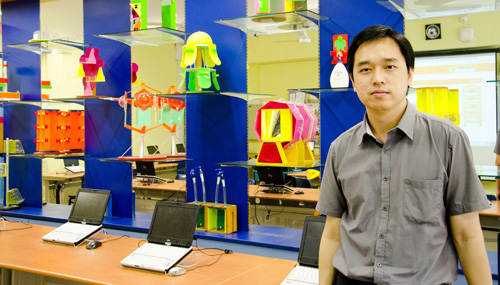Young Children’s Voices in Mathematical Problem Solving
Contributed by Dr Ho Siew Yin and Sng Wei Qin Abbie, from NTUC First Campus, for SingTeach Virtual […]
Read More
Computer games – Parents and teachers may sometimes complain that children spend way too much time playing them. But a teacher finds out that they can be a great way to learn!
 Gaining students’ full attention in class is every teacher’s dream. In talking to his students, Mr Sean Han of Changkat Changi Secondary School realizes that there’s something that gets them going: computer games.
Gaining students’ full attention in class is every teacher’s dream. In talking to his students, Mr Sean Han of Changkat Changi Secondary School realizes that there’s something that gets them going: computer games.
“I know some of them are very into games,” says the Design & Technology teacher. “They will play sometimes, I hear, throughout the night and they will be tired when they come to school!”
Sean and his friends used to play such games when they were students too. So instead of thinking of games as competing with him for his students’ attention, Sean decided to explore it and use it to help his students learn better.
“Motivation in game-based learning is already almost a given,” Sean says. “A lot of research has shown that games make students more motivated.”
What isn’t so clear-cut is the effect of game-based learning on students’ results. Sean decided this is worth looking into, as part of his Masters study on game-based learning.
He first introduced and taught the topic of Environmental Sustainability to his Secondary 1 class. Students in the experimental group then went on to play the online game Electrocity, while those in the control group didn’t.
Electrocity is a New Zealand-based free online game that aims to raise awareness about energy and the environment among the New Zealanders.
Players are tasked to create a virtual city and choose from various power-generating methods to keep the city running. Whether they’ve done a good job depends on the state of the city’s environment and also how happy the virtual citizens are to live in the city.
Some power-generating methods are cheap but cause pollution while others may be expensive but doesn’t pollute the environment as much.
“Students have to recognize and understand the impact of a particular power-generating method,” Sean shares, “and how it affects the virtual citizens and the environment.”
If students choose something that is cheap but pollutes the city, Sean says that the “happiness level will drop, and the virtual citizens will start to complain.”
Those who decide to be environmentally friendly and choose more expensive options may run out of money and become bankrupt. A few students had to restart the game a few times because of this, but Sean doesn’t mind.
“One thing about games is that the simulated environment allows students to fail and then learn from that failure,” he says. Students also get to see that there’re many different ways to build a sustainable city.
 After the game, the students sat for a test on environmental sustainability. Both groups did equally well for the multiple-choice questions, which tested them on facts. But the experimental group fared better for open-ended questions.
After the game, the students sat for a test on environmental sustainability. Both groups did equally well for the multiple-choice questions, which tested them on facts. But the experimental group fared better for open-ended questions.
Students who played Electrocity were able to apply their knowledge in energy generation and explain its impact on people and the different consequences. They were also able to elaborate and justify their stand more coherently.
When Sean interviewed these students, he noted that the game helped them to link the concepts that he had taught them to real-life application.
Perhaps it was their sense of empathy that helped them to learn better. During the interviews with Sean, they shared that they felt bad when their virtual citizens suffered from the effects of pollution.
“Through the game, they were able to relate the concepts to themselves. Because when I asked things like ‘What if you were living in this city and you know there is a plan to build a power-generating plant? How would you feel?’ They were able to actually tell me that solar panels placed on HDB roofs are better.”
Although his study is a small-scale one, Sean is encouraged by the results and the fact that his students enjoyed the learning. “I was concerned that the students may be having too much fun and not be focused. But it turned out that they were really quite into it!”
Computer games have always been seen as a distraction, but now it seems that they can even be a teacher’s best friend in the classroom!